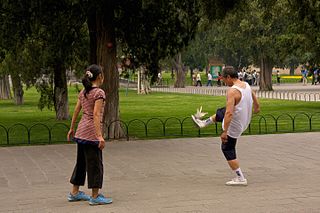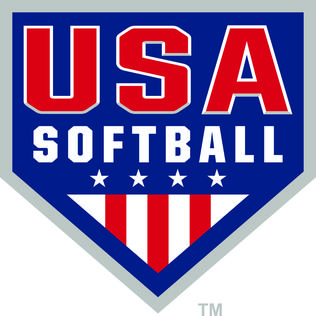
Cheerleading is an activity in which the participants cheer for their team as a form of encouragement. It can range from chanting slogans to intense physical activity. It can be performed to motivate sports teams, to entertain the audience, or for competition. Cheerleading routines typically range anywhere from one to three minutes, and contain components of tumbling, dance, jumps, cheers, and stunting. Cheerleading originated in the United States, where it has become a tradition. It is less prevalent in the rest of the world, except via its association with American sports or organized cheerleading contests.

Flag football is a variant of gridiron football where, instead of tackling players to the ground, the defensive team must remove a flag or flag belt from the ball carrier ("deflagging") to end a down. In flag football, contact is limited between players. The sport has a strong amateur following with several national and international competitions each year sponsored by various associations but is most popularly played in America where it was invented. The international governing body for the sport is the International Federation of American Football (IFAF). In 2022, flag football was shortlisted as a proposed discretionary event for the 2028 Summer Olympics in Los Angeles, with inclusion being accepted on October 16, 2023.

Underwater hockey (UWH), also known as Octopush in the United Kingdom, is a globally played limited-contact sport in which two teams compete to manoeuvre a puck across the bottom of a swimming pool into the opposing team's goal by propelling it with a hockey stick.

USA Lacrosse is the national governing body of men and women's lacrosse in the United States. It provides a leadership role in virtually every aspect of the game and has more than 450,000 members throughout the United States, and offers programs and services to inspire participation while protecting the integrity of the sport. The USA Lacrosse national headquarters is located in Sparks, Maryland along with the Lacrosse Museum and National Hall of Fame. In addition, the headquarters campus features the IWLCA Building, Tierney Field and a memorial to the members of the lacrosse community that died in the September 11, 2001 terrorist attacks. USA Lacrosse also oversees the U.S. National Teams, which have won a combined 30 world championships.

Jiànzi, tī jiànzi (踢毽子), tī jiàn (踢毽), or jiànqiú (毽球), is a traditional Chinese sport in which players aim to keep a heavily weighted shuttlecock in the air using their bodies apart from the hands, unlike in similar games such as peteca and indiaca. The primary origin of jianzi is an ancient Chinese game called Cuju, from the Han dynasty, 2,000 years ago. Jianzi is played on a badminton court using inner or outer lines in different competition settings. It can also be played artistically, among a circle of players in a street or park, with the objective to keep the shuttle 'up' and show off skills. In Vietnam, it is known as đá cầu, and it is the national sport. In the Philippines, it is known as sipa and was also the national sport, until it was replaced by arnis in December 2009.
The International Kickboxing Federation (IKF) is a sanctioning body for kickboxing and Muay Thai based in the United States. The IKF sanctions and regulates all aspects of these sports from Semi Contact to Full Contact in both Amateur and professional levels. The IKF World Headquarters located in Newcastle, California, USA oversees over 2,000 IKF events a year around the world.

The International Softball Federation (ISF) is the former international governing body for the sport of softball with its world headquarters and training centre at Plant City, Florida. The ISF is a non-profit corporation recognized by the International Olympic Committee (IOC) and SportAccord.

In the sport of association football, fouls and misconduct are acts committed by players which are deemed by the referee to be unfair and are subsequently penalised. An offence may be a foul, misconduct or both depending on the nature of the offence and the circumstances in which it occurs. Fouls and misconduct are addressed in Law 12 of the Laws of the Game. A foul is an unfair act by a player, deemed by the referee to contravene the game's laws, that interferes with the active play of the match. Fouls are punished by the award of a free kick to the opposing team. A list of specific offences that can be fouls are detailed in Law 12 of the Laws of the Game ; these mostly concern unnecessarily aggressive physical play and the offence of handling the ball. An infringement is classified as a foul when it meets all the following conditions:
- It is committed by a player ;
- It occurs on the field of play;
- It occurs while the ball is in play;
- It is committed against an opponent.

The United States Snooker Association (USSA) is the internationally recognized governing body of the sport of snooker in the United States, with its current headquarters registered in Berkeley, California.

The Badminton World Federation (BWF) is the international governing body for the sport of badminton recognised by the International Olympic Committee (IOC). It was founded in 1934 as the International Badminton Federation (IBF) with nine member nations. In 1981 the IBF merged with the World Badminton Federation, and on 24 September 2006, at the Extraordinary General Meeting in Madrid, the name of the organization was changed to Badminton World Federation (BWF).
Footbag net is a sport in which players kick a footbag over a five-foot-high net. Players may use only the feet. Any contact knee or above is a foul. The game is played individually and as doubles.

USA Softball is the governing body for the United States national softball team. It is a member of the sport's international governing body, the World Baseball Softball Confederation (WBSC). In addition, it oversees more than 150,000 amateur teams nationwide. It is a 501(c)(3) non-profit organization.

The World Darts Federation (WDF) is a sport governing body and a tournament organiser for the game of darts. It was formed in 1974 by representatives of the original fourteen founding members. Membership is open to the national organising body for darts in all nations. The WDF encourages the promotion of the sport of darts among and between those bodies, in an effort to gain international recognition for darts as a major sport. The WDF is a full member of Global Association of International Sports Federations, which is the governing body for international sports federations.

The International Federation of Cheerleading (IFC) was formed in 1998 and is a non-profit federation based in Tokyo, Japan.

Cheerleading Philippines Federation (CPF) is the national confederation of Cheerleading organizations. It is the national governing body of Cheerleading and Cheer Dance in the country. Its primary activities are organized through standing Commissions that are each responsible for some aspect of cheerleading's development in the country. The CPF is mandated to sponsor and sanction cheerleading & cheer dance competitions and a variety of national and international cheerleading competitions, including the Cheerleading World Championships, the Asia Cup, the IFC World Cup. Its headquarters is located in Makati, Manila, Philippines.
The International Unicycling Federation (IUF) is the international governing body for the sport of unicycling. It was founded in 1982 in the United States but is composed of representatives of unicycling nations from around the world. Funding comes from participants at organised events, primarily the biennial Unicon world unicycling championships.
The Detroit Dark Angels were a women's semi-professional American football team founded in 2010 by Chuck Lauber and Aaron Brothers. In 2014, the team was purchased and reorganized as a 501(c)3 corporation DDA Football Inc., by a group that included former Detroit Demolition players Alecia Sweeney and Yarlen Henry along with Coach Keith Thomas.

Squash Doubles is a variant of the racket sport squash played by four people in two-person teams. Doubles squash was first played at the Racquet Club of Philadelphia in 1907. Today there are four major doubles organizations overseeing the sport in North America and more than 15,000 players: Squash Canada, U.S. Squash, the ISDA and the WDSA. The four groups organize and oversee the management of all aspects of doubles including junior and adult play from beginner to elite professional competition. In addition, the four organizations collaborate in efforts to grow and promote the game.

Martin Sladek is multiple world and European freestyle footbag champion. He won the world title in 2009, 2011, 2014-2016. In 2009 he won in 2 disciplines: the main one and Doubles Circle Contest. He won the 1st place in 2008-The most successful athlete in the Special sport performance category and also judges at world footbag championships of footbag. His routines reached the best level of technical merit, artistic impression and cooperation and the performance presented by him at the 2009 world footbag championship in Berlin is the top rated performance in all the three criteria in the history of the sport.

A footbag is a small, round bag usually filled with plastic pellets or sand, which is kicked into the air as part of a competitive game or as a display of dexterity. "Hacky Sack" is the name of a brand of footbag popular in the 1970s, which has since become a generic trademark.